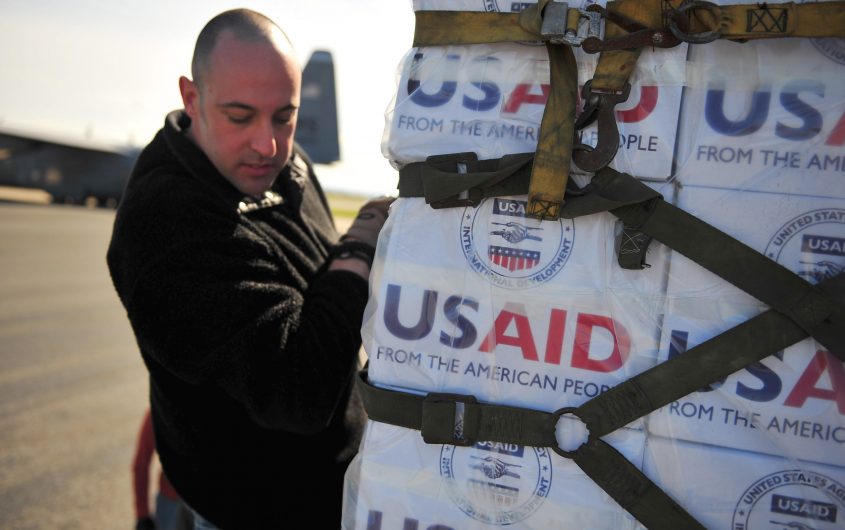
U.S. Army photo/Staff Sgt. Brendan Stephens
Fostering Tunisia’s Democratic Transition: Why Germany, Europe, and the United States Need to Join Forces

Anna Stahl
Jacques Delors Centre
Dr. Anna Katharina Stahl is a Policy Fellow for European foreign and security policy at the Jacques Delors Centre. Her work focuses on the EU’s relations with China and the United States, as well as geopolitics in Africa and the Middle East. Before joining the Jacques Delors Centre, Anna Stahl was a project director with the Friedrich-Ebert-Stiftung (FES) in Tunisia. Dr. Stahl held research positions in Europe, the United States and Africa with the EU-China Research Centre at the College of Europe, the United States Institute of Peace (USIP), the American Institute for Contemporary German Studies (AICGS), the Institute for European Studies (IES) at the Free University of Brussels and the Centre for Chinese Studies (CCS) at Stellenbosch University.
Anna Stahl obtained a PhD in political science from the Free University of Brussels (VUB) and holds degrees from the College of Europe, the Université Libre de Bruxelles (ULB), the Institute d’Etudes Politiques de Lille and the Westfälische Wilhelms-Universität Münster. She is the author of the book “EU-China-Africa Trilateral Relations in a Multipolar World” (Palgrave Macmillan, 2018).
She is a 2018-2019 participant in AICGS’ project “A German-American Dialogue of the Next Generation: Global Responsibility, Joint Engagement,” sponsored by the Transatlantik-Programm der Bundesrepublik Deutschland aus Mitteln des European Recovery Program (ERP) des Bundesministeriums für Wirtschaft und Energie (BMWi).
The awarding of the 2015 Nobel Peace Prize to the Tunisian National Dialogue Quartet gives hope that Tunisia is becoming a model of democracy in the region. Following the 2010 revolution, leading experts called for a transatlantic strategy to support the democratic ambitions of Tunisians. Nine years after the “Arab Spring,” Tunisia’s democratic transition remains fragile, and America and Europe are drifting apart in their efforts to support the Jasmine revolution.
U.S., German, and European Union Support for Tunisia
The “Arab Spring” began in Tunisia though a popular uprising after decades of misrule under longtime autocrat Ben Ali. The revolution swept him out of power and set the country on the path toward democracy. In order to support Tunisia’s transition, the United States and Europe provide substantial financial support. Alongside programs of USAID and the European Neighborhood Policy, individual European member states, like Germany, are assisting the country. This international support has helped Tunisia adopt a progressive constitution, hold elections, and establish independent democratic institutions.
As importantly, the U.S. and Europe support the young people who led the revolution. Activists have formed numerous civil society organizations (CSOs), which act outside of mainstream politics to address crucial issues, including anti-corruption, human rights, regional development, and environmental protection.
Initial Transatlantic Security Collaboration
The security situation in Tunisia, as in much of the MENA region, remains fragile. Following the 2012 assault of the U.S. embassy in Tunis and the 2015 terrorist attacks, the U.S. and Europe have increased their aid to Tunisian security forces. Security Sector Reform (SSR) programs, carried out by organizations like USIP and Dcaf, play a vital role in improving Tunisia’s security sector governance.
Among European donors, Germany has considerably boosted its security assistance to Tunisia. The “Enable and Enhance Initiative” (E2I) represents the newest security assistance tool from Germany. Launched in 2015, the aim of this German initiative is to “enable regional actors to provide security and stability in their own neighborhoods, ranging from crisis prevention to crisis management, post-crisis rehabilitation, and peacebuilding.” The E2I is based on an independent budget line, which allows the German government to support security programs (e.g., equipment and training) in a series of countries, including Tunisia.[1]
Transatlantic security collaboration in Tunisia is primarily concerned with border security. The enduring conflict in Libya, as well as the ongoing discontent among youths in the interior of the country and in regions along the Libyan border present some of the root causes of growing Islamist radicalization in Tunisia. Over the past years, an increasing number of jihadists from Tunisia have joined the Islamic State (ISIS) to fight in battlefields in Libya and Syria. To secure the border between Tunisia and Libya, Germany and the U.S. created in 2017 a joint fund to support the Tunisian government in setting up an electronic border surveillance system.
Tunisia’s Transition at a Crossroads
As pointed out by Andrew Miller, deputy director for policy at POMED, U.S. engagement in Tunisia is diminishing, especially since President Trump came into office. For the second consecutive year, the White House has called for substantial cuts in U.S. assistance to Tunisia. Yet, Tunisia’s transition remains incomplete and there are serious risks of democratic backsliding. In May, the country held its long-delayed first municipal elections. Next year, Tunisia will have its second presidential and parliamentary elections.
2019 represents a major test for Tunisia’s democratic consolidation. The results of the recent U.S. midterm elections could present an opportunity for a joint transatlantic approach. Experts like Youssef Cherif have argued that the current lack of attention for Tunisia from the president could be compensated for through congressional support. The fact that the Democrats took control of the House could make the Congress a supporter of continued U.S. assistance to Tunisia and thereby stop the impression of Europe that the U.S. is disengaging from Tunisia just as the going gets tough. If Americans and Europeans succeed in joining forces to support Tunisia, this could also provide a glimmer of hope for the MENA region more broadly, which remains at the heart of global security concerns.
[1] A. Stahl & J. Treffler (forthcoming): “External Players and Security Sector Reform in Tunisia: The Case of Germany and the Enable and Enhance Initiative,” EuroMeSCo Policy Brief.









